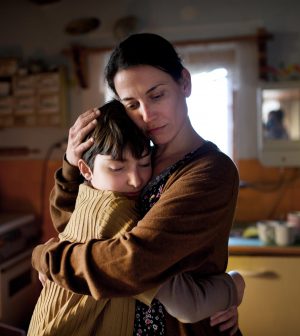- Does the Water in Your House Smell Funny? Here’s Why
- Can a Daily Dose of Apple Cider Vinegar Actually Aid Weight Loss?
- 6 Health Beverages That Can Actually Spike Your Blood Sugar
- Treatment Options for Social Anxiety Disorder
- Understanding the Connection Between Anxiety and Depression
- How Daily Prunes Can Influence Cholesterol and Inflammation
- When to Take B12 for Better Absorption and Energy
- Epsom Salts: Health Benefits and Uses
- See What Saffron Can Do for Sleep and Heart Health
- 6 Common Mistakes to Avoid Before Your Physical
Cancer Can Take Financial Toll on a Survivors’ Kids: Study

Cancer affects families in numerous ways, and kids whose parents have had cancer are more likely to be hungry and to go without everyday essentials than their peers, a new American Cancer Society study reveals.
“Cancer is a life-threatening disease, and parents with a history of cancer are often saddled with worry about paying for food, the rent or mortgage, and other monthly bills,” said lead author Zhiyuan (Jason) Zheng, senior principal scientist of health services research at the cancer society.
“Our earlier research has shown us how a parent’s diagnosis of cancer can impact a child’s physical and mental health, but not much was known about the social and economic impact until now. We hope these findings will help shine a spotlight on this important issue,” he said in an ACS news release.
Researchers used the 2013 to 2018 U.S. National Health Interview Survey to identify children ages 5 to 17 with parents who did and did not have a cancer history.
Families provided information about unmet economic needs in these annual surveys.
Parental cancer history was associated with more worry about food running out and inability to afford balanced meals. It was also tied to worries about paying monthly bills, housing costs and delays in child medical care because of lack of transportation.
Among kids with a parental cancer history, those most vulnerable were girls, Black children, and those whose parents had multiple health issues or were poor, the study found.
“Strategies are needed to identify children with a parental cancer history and to identify and address these critical unmet needs,” Zheng said. “Also, further study is needed to determine if these unmet economic and social needs among children last through adulthood.”
The findings were published June 22 in JAMA Network Open.
More information
The U.S. National Cancer Institute has more on cancer and financial distress.
SOURCE: American Cancer Society, news release, June 22, 2023
Source: HealthDay
Copyright © 2026 HealthDay. All rights reserved.










